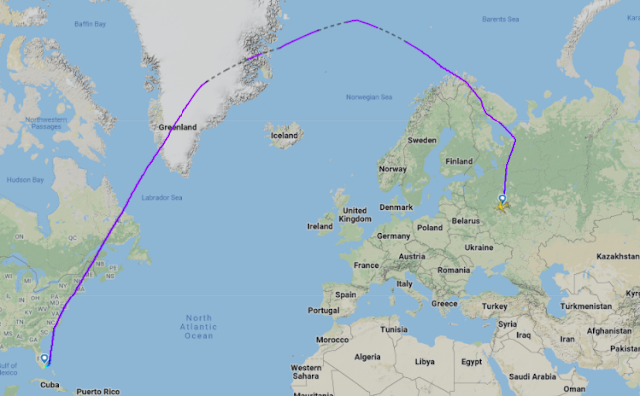Canada States Aeroflot Flight Violated Its Airspace Ban
In a tweet posted on Sunday evening, Transport Canada confirmed that Aeroflot violated flyover restrictions. The flight, SU111, originated in Miami and flew through Canadian airspace roughly five hours after restrictions were implemented.
Transport Canada will conduct an investigation into the airspace breach and is taking steps to ensure it does not happen again, commenting that they will not hesitate to take appropriate enforcement action to prevent future violations.
Canadian air traffic control manager, NAVCAN, has confirmed with Reuters that Aeroflot did enter Canadian airspace. The aircraft operator declared a humanitarian flight, requiring special handling by air traffic control. The agency has said:
"We are currently cooperating with Transport Canada to investigate the occurrence, and are working with neighbouring Air Navigation Service Providers to support rerouting of aircraft prior to them entering Canadian-controlled airspace."
Canadian airspace ban
Canadian airspace has been closed to Russian aircraft since 27 February, coming as part of an extensive sanctions package to target the Russian government over the invasion of Ukraine. Until further notice, the Canadian government has prohibited the operation of any Russian-owned, chartered, or operated aircraft in Canadian airspace, including territorial waters.
Minister of Transport, Omar Alghabra, has said:
“All of Canada is united in its outrage of President Putin’s aggression against Ukraine. In response, we have closed Canadian airspace to Russian-owned or operated aircraft. The Government of Canada condemns Russia’s aggressive actions and we will continue to take action to stand with Ukraine.”
European and UK sanctions
Similar restrictions from the United Kingdom have been in place since Friday, whilst the European Union announced a bloc-wide closure to Russian air traffic on Sunday afternoon. The European Union has also placed several other sanctions, including a ban on the export of aircraft and aviation equipment into Russia, and a ban on Russian state-owned media outlets.
First, we are shutting down the EU airspace for Russian-owned, Russian registered or Russian-controlled aircraft.
— Ursula von der Leyen (@vonderleyen) February 27, 2022
They won’t be able to land in, take off or overfly the territory of the EU.
Including the private jets of oligarchs. pic.twitter.com/o551M9zekQ
Russia has yet to respond to both the Canadian and EU-wide airspace ban, though reciprocal restrictions for the United Kingdom and early announcing European nations remain in place.
The United States is currently considering similar sanctions, though it has yet to make a final decision. However, the US government has advised its citizens to leave Russia immediately, citing the increasing number of airlines canceling flights and airspace restrictions.
It is believed that a tit-for-tat ban by Russia could significantly impact the operation of United States-based carriers into Asia and the Middle East, triggering longer flight times and cancellations. European carriers, including British Airways, Air France, and Finnair, have already announced the suspension of some Asian routes.
A combination of sanctions from Europe, Canada, and the United States would damage Aeroflot's South American operations. Transport Canada has said there are no direct flights between Russia and Canada; however, several Russian flights use their airspace each day.










0 Comments